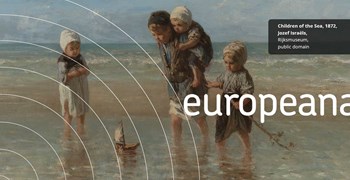Love across borders: the tailor and the soldier
We have recently begun collecting personal stories from people all across Europe relating to migration, following on from our successful Europeana 1914-1918 project.
This short blog series, Love across borders, is inspired by collections discovered during this project, with stories of romance and love at the time of World War 1. Read on to see how new connections and relationships would not have been possible without people moving across the globe!
Wars like the First World War brought a lot of pain and terror in the countries involved. But they also brought people together who may never have otherwise met. Just like Maria Apollonia Rittel and the American soldier who later became the father of her child.
In 1919, when the war was finally over, Maria Apollonia was a young tailor living in Düsseldorf, Germany. She met an American soldier who was stationed in Koblenz and fell in love with him. He was a Captain of the 3rd US Army’s Medical Corps. When he had to return to the US with his troops, he promised her that she could join him there later.
But this never happened, as on the way back to the US his ship sank. This was the only information Maria heard. They never saw each other again. Still, there has always been someone to remind her of this romantic episode: Karl, the son who never got to know his father.

Maria Apollonia and her son Karl, who never got to know his father, Michael Josef Rittel, CC0.
Until today, this remains a gap in the family’s history. Karl’s son, Michael only owns one picture of his grandfather and is still searching for more information about him and this love story.
Do you have a story to share about love across borders, or romance during World War 1? Share your stories with Europeana Migration and Europeana 1914-1918.
· The Love across borders series was researched and written by Larissa Borck













